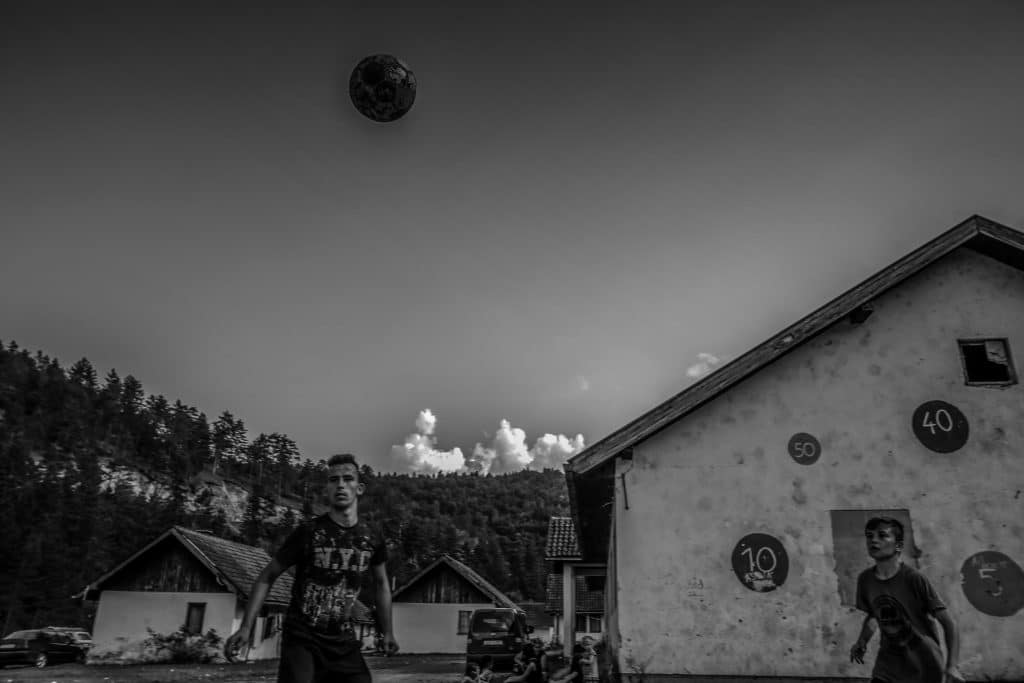Dr Branka Antić Štauber (to the left) in one of the 156 refugee camps that still exist in Bosnia.
Loza Foundation has partnered up with an organisation called “Snaga Zene” (The Power of Women):
They have been called “the women that were left behind”. Thousands of widows, mothers, sisters and daughters lost everything in the Bosnian war and still, to this day, live in refugee camps; stuck without the power or possibility to make it back to their home again.
“We want to help these women to integrate back into society and to be able to support themselves financially. Regain their lives again”, says Sabina Grubbeson, founder of Loza Foundation.
More than 20 years have passed since the Bosnia-Herzegovina war, but the women who were forced to leave their homes, subjected to systematic rapes and who lost their nearest and dearest, are still plagued by horrible memories. During the war, a great number of women and children gathered in refugee camps and many of them are still there today, socially rejected and often extremely poor. The majority are suffering from post-traumatic stress and illnesses as a result of the abuse and experiences during the war. The children, who have grown up in these circumstances, are also deeply affected by the life in these camps where depression and grief are rife.
“The cause of this situation is their fear of returning to their old towns and villages, the fear of meeting their neighbours and villagers that killed their relatives during the war and this fear has turned into them refugees in their own country. Today they live outside the realms of society and have lost their faith in the future”, says Sabina Grubbeson.
Loza Foundation has now ventured into a joint project with Snaga Zene, the Power of Women, an association founded in 1999 in Tuzla a couple of years after the Bosnian war ended and is run by Dr Branka Antić Štauber. The aim is to help the 7,000 thousand women and children that still live in the 156 refugee camps left in Bosnia.
“The Power of Women has developed a successful model that incorporates psychological rehabilitation, legal advice, medical support as well as economic and social support. They, for instance, buy greenhouses for the families and educate them on how to grow their own vegetables and plants. This is so that they can make a living, but also to aid their mental healing.”
Thanks to The Power of Women, so far 300 women from the refugee camps have been able to return to their former home in Srebrenica. The infamous town where more than 8,000 Muslim boys and men were killed in a mass execution in July 1995. An unforgettable, insurmountable trauma one might think, but with the support from this organisation the women have reintegrated into society and made peace with their neighbours.
“One of the women in Srebrenica told us about the fabulous work Dr Branka does and that she, with the help of The Power of Women and her efforts in the greenhouse, has healed her wounds and reconciled with the hardship of her past. Today she can support herself financially by selling her crops and she has regained her faith in the future, which is just amazing to witness”, says Sabina Grubbeson.
The Power of Women is established in 14 towns and cities across Bosnia and their purpose is to help victims from concentration camps, sexual abuse and systematic rapes. By working with the Bosnian organisation, Loza Foundation hopes that more women will be given an opportunity to pursue some form of education and find a way out of the vacuum they have ended up in.
“We hope that these refugee camps will be emptied eventually. Social rejection and discrimination bring hatred, hostility and divergence. Children that grow up in circumstances such as these risk getting off on the wrong foot straight from the start or end up with a skewed view of life. We want to be behind all the women that need help to put their life back together, to give them a chance to succeed and this, in turn, will give the children the chance of a better future.
Through their collaboration with The Power of Women, Loza Foundation has been given access to vulnerable, exposed women in Bosnia, which enables the foundation to support and give them strength in a professional and successful way.
“Now we need private individuals and companies in Sweden to support our work and donate money to the project so that these women and their children, who have already had to endure so much suffering and hardship, can be given a better life.
“For many of these people, the war is still carrying on. We want an end to this.

“I have lost my eyesight and nothing matters anymore. It is hard to function properly and run the household once the children have gone to school as I can’t get around on my own.”
One of Suhra’s children is called Amela. She is 18 years old and she dreams of becoming a police officer.

“It is hard to forget. I wish these terrible things had never happened and I wouldn’t wish them on anyone, not even the people who did this. To be caught in PTSD is something like having a horrendous headache and the pain feels like it could cause the whole world to collapse.”


Today the women that have returned to Srebrenica work, cook and eat together. You can tell just by looking at us that we are doing well, we’re not skinny anymore”, says Mirsada with a giggle.

